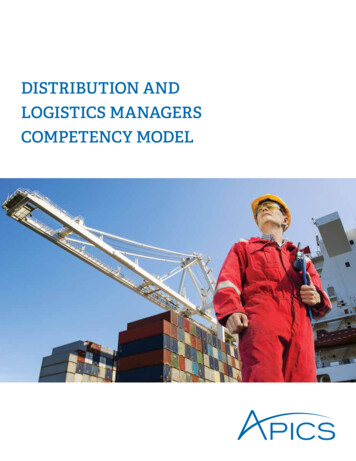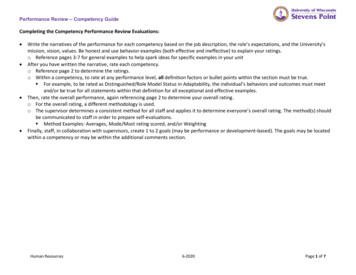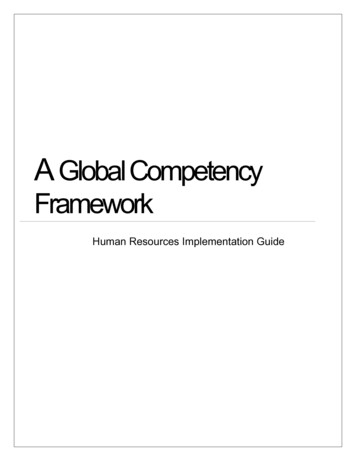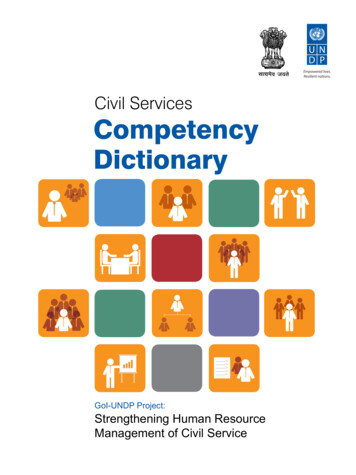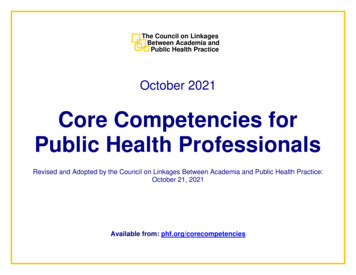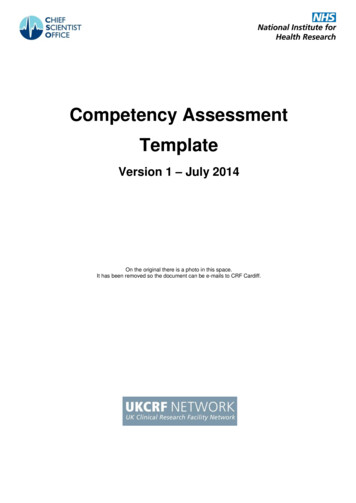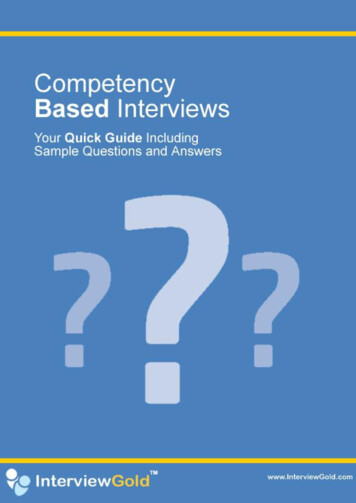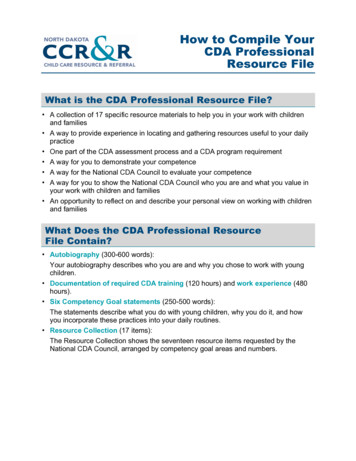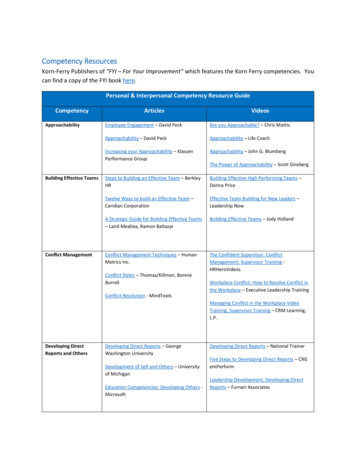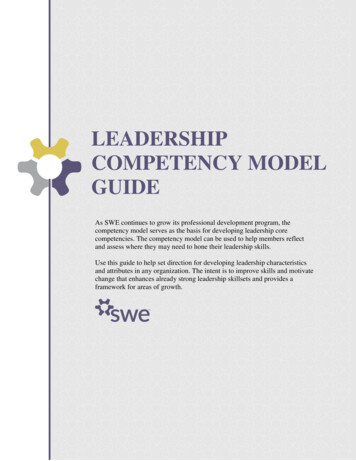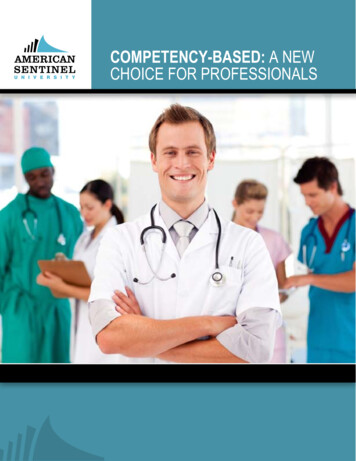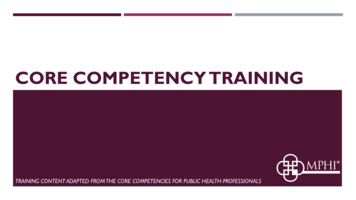
Transcription
CORE COMPETENCY TRAININGTRAINING CONTENT ADAPTED FROM THE CORE COMPETENCIES FOR PUBLIC HEALTH PROFESSIONALS
LEARNING OBJECTIVES1. Define the Core Competencies for Public HealthProfessionals.2. Describe the different Core Competency tiers.3. Identify the importance and benefits of the CoreCompetencies.4. Describe the eight domains of the Core Competencies.
WHAT ARE THE CORE COMPETENCIES?The Core Competencies for Public Health Professionals (Core Competencies) are:Foundational skills for publichealth services10 Essential Public Health ServicesWorkforce Development PlanningStarting point for public health professionals and organizations as they work tobetter understand and meet workforce development needs, improve performance,prepare for accreditation, and enhance the health of the communities they serve.
CORE COMPETENCY DEVELOPMENTDeveloped by the Council on Linkages Between Academia andPublic Health Practice In 1991, the Universal Competencies by the Public HealthFaculty/Agency Forum was developed The current version of the Core Competencies adopted on June 26,2014, following a yearlong review and revision process. Regularly reviewed and revised by the Core CompetenciesWorkgroup
CORE COMPETENCY TIERSTier 3: SeniorManagement/Executive LevelTier 2: ProgramManagement/Supervisory LevelTier 1: Front LineStaff/Entry LevelTier A: AdministrativeSupport StaffAdministrative, clerical, facilities,technicians, and IT supportpositionsCarry out the day-to-day tasksof public health organizationsand are not in managementpositions.Program management orsupervisory roles.Senior management level andto leaders of public healthorganizations.
WHY ARE PUBLIC HEALTH CORE COMPETENCIES IMPORTANT? Develop a stronger public health workforce Improve the performance of the organization and workforce basedon national standards Facilitate communication across the organization at all levels Serves as a basis for workforce assessments and workforcedevelopment plans Determine an organization’s direction and agency plans foremployee professional development and expectationsUniversity of South Florida College of Public Health
WHAT ARE THE BENEFITS OF USING THE CORE COMPETENCIES? Assures a competent workforce that can carry out the essential public healthservices in all areas of public health practice Useful in writing job descriptions and training curricula Provide a clear, systematic, and flexible method to acquire new skills and knowledge Establishes transparent workforce planning, performance standards, performanceassessments, and succession plans Benefits both the employee and the organization Provide a basis for professional development opportunities/prioritiesUniversity of South Florida College of Public Health
CORE COMPETENCIES: 8 DOMAINS
CORE COMPETENCY t/ProgramPlanning SkillsCommunityDimensions ofPractice SkillsCulturalCompetencySkillsPublic HealthSciences SkillsCommunicationSkillsFinancialPlanning andManagementSkillsLeadership andSystemsThinking Skills
ANALYTICAL/ASSESSMENT SKILLSDEFINITION:Identifying and understanding data, turning data into information for action, assessingneeds, developing community health assessments, and using evidence for decisionmaking.What does this mean?Identifying, understanding, and assessing data from multiple sources. Using data toinform action and as evidence for decision making.
ANALYTICAL/ASSESSMENT SKILLSThis skill includes:Ethical use of dataData analysisEvidence-based decision makingInformation technologyCommunity health assessmentData collection
ANALYTICAL/ASSESSMENT SKILLS- SCENARIOAs part of their program planningprocess at the local health department,an employee reviews published reportsfor population-based health indicatorsthat are associated with the populationin their community.
POLICY DEVELOPMENT/PROGRAM PLANNING SKILLSDEFINITION:Determine needed policies and programs; advocating for policies and programs; planning,implementing, and evaluating policies and programs; developing and implementing strategiesfor continuous quality improvement; and developing and implementing community healthimprovement plans and strategic plans.What does this mean?Determining the need for and the development, implementation, and evaluation ofpolicies, programs, and services. Work to develop and implement qualityimprovement strategies, community health improvement plan, and strategic plan.
POLICY DEVELOPMENT/PROGRAM PLANNING SKILLSThis skill includes:Community healthimprovement planningApplying public healthinformaticsStrategic planningInfluence external policy,programs and servicesPolicy, program and servicedevelopment/implementation/improvement
POLICY DEVELOPMENT/PROGRAM PLANNING SKILLS- SCENARIOAligning with new legislative regulations, alocal health department updates theiremergency response plan and associatedtraining.
COMMUNICATION SKILLSDEFINITION:Assess and address population literacy; soliciting and using community input;communicating data and information; facilitating communications; and communicatingthe roles of government, health care, and others.What does this mean?Communicate relevant data/information. Discuss the differing roles of governmentand non-government organizations in public health. Determine the literacy level ofthe population to assure information distributed is understandable by the populationserved. Gather and use community input.
COMMUNICATION SKILLSThis skill includes:Gathering community inputLiteracy assessmentInformation disseminationWritten and oral communicationFacilitation
COMMUNICATION SKILLS- SCENARIOUsing data collected from the localhealth department’s CommunityHealth Assessment, an employeecreates a poster presentation todemonstrate the needs of thecommunity to their Board of Health.
CULTURAL COMPETENCY SKILLSDEFINITION:Understand and respond to diverse needs, assessing organizational cultural diversityand competence, assessing effects of policies and programs on different populations,and taking action to support a diverse public health workforce.What does this mean?Assess and understand the impact of policies and programs on diverse populations.Address population diversity in policies, programs, and services. Assess theorganization’s cultural diversity and competence, and take action to support a diverseworkforce.
CULTURAL COMPETENCY SKILLSThis skill includes:Recognizing population diversityRecognizing workforce diversityCultural influences on policy,programs and servicesPolicy, program and services impacts
CULTURAL COMPETENCY SKILLS- SCENARIOHealth educators use focus groups,interviews, and community forums tocollect information about a specificpopulation’s public health needs.
COMMUNITY DIMENSIONS OF PRACTICE SKILLSDEFINITION:Evaluate and develop linkages and relationships within the community, maintaining andadvancing partnerships and community involvement, negotiating for use of community assets,defending public health policies and programs, and evaluating effectiveness and improvingcommunity engagement.What does this mean?Develop, maintain, and evaluate partnerships within the community to improvecommunity engagement. Engage community members and partners to provide inputfor developing and assessing programs and policies.
COMMUNITY DIMENSIONS OF PRACTICE SKILLSThis skill includes:Relationship buildingPartner collaborationAdvocacyCommunity engagementLeverage community assetsCommunity-based participatory research
COMMUNITY DIMENSIONS OF PRACTICE SKILLS- SCENARIOA local health department programsupervisor works with communitypartners to build relationships andidentify their needs, interests,concerns, and assets to address thecommunity’s needs.
PUBLIC HEALTH SCIENCES SKILLSDEFINITION:Understand the foundation and prominent events of public health, applying publichealth sciences to practice, critiquing and developing research, using evidence whendeveloping policies and programs, and establishing academic partnerships.What does this mean?Understand public health concepts and historical events and apply to daily work.Review and use research and evidence when developing policies, programs, andservices.
PUBLIC HEALTH SCIENCES SKILLSThis skill includes:Understand the scientific foundationof public healthApply public health sciencesUse public health evidence inpolicies and programsEstablish academic partnershipsContribute to evidence-based public healthUse ethical research practices
PUBLIC HEALTH SCIENCES SKILLS- SCENARIOA breastfeeding peer counselor at the localhealth department researches and usesproven strategies to increase initiation andduration of breastfeeding among mothers.
FINANCIAL PLANNING AND MANAGEMENT SKILLSDEFINITION:Engage other government agencies that can address community health needs, leveraging public healthand health care funding mechanisms, developing and defending budgets, motivating personnel,evaluating and improving program and organization performance, and establishing and usingperformance management systems to improve organization performance.What does this mean?Engage government partners to help address community health by leveragingavailable funding. Develop and defend budgets. Evaluate and improve healthdepartment performance through the use of a performance management system.
FINANCIAL PLANNING AND MANAGEMENT SKILLSThis skill includes:Implement policies and proceduresof the governing bodyBudgetingLeverage public health andhealth care fundingPerformance managementFinancial analysisTeam building/motivationProposal writingContract negotiation
FINANCIAL PLANNING AND MANAGEMENT SKILLS- SCENARIOThe human resources department ata local health department developsand reviews staffing levels andbudgets to ensure the agency hascapacity to provide grant-fundedservices.
LEADERSHIP AND SYSTEMS THINKING SKILLSDEFINITION:Incorporating ethical standards into the organization; creating opportunities for collaboration amongpublic health, health care, and other organizations; mentoring personnel; adjusting practice to addresschanging needs and environment; ensuring continuous quality improvement; managing organizationalchange; and advocating for the role of governmental public health.What does this mean?Convene and collaborate with public health system partners. Adapt to changingneeds of the community, the workforce, and the organization. Assure continuousimprovement and engage in ethical practices.
LEADERSHIP AND SYSTEMS THINKING SKILLSThis skill includes:Continuous improvementProfessional developmentSystems thinkingChange managementIdentify factors impactingeffectivenessAdvocate for governmentalpublic health
LEADERSHIP AND SYSTEMS THINKING SKILLS- SCENARIOA public health committee led by the localhealth department addresses the socialdeterminants of health to improve thecommunity’s health status.
CONTACT INFORMATIONJessie JonesJeanette Balljjones@mphi.orgjball@mphi.org
CORE COMPETENCY TRAININGTRAINING CONTENT ADAPTED FROM THE CORE COMPETENCIES FOR PUBLIC HEALTH PROFESSIONALSHello everyone and welcome to the Core Competency Training! This informationwill be helpful to you as your agency is preparing to collect workforce assessmentdata.1
LEARNING OBJECTIVES1. Define the Core Competencies for Public HealthProfessionals.2. Describe the different Core Competency tiers.3. Identify the importance and benefits of the CoreCompetencies.4. Describe the eight domains of the Core Competencies.With the information from this training you all will be able to:1. Define the Core Competencies for Public Health Professionals.2. Describe the different Core Competency tiers, which is especially helpful as youwork on your Core Competencies assessment.3. Identify the importance and benefits of the Core Competencies, both toemployees and to the health department.4. and Describe the eight domains of the Core Competencies.2
WHAT ARE THE CORE COMPETENCIES?The Core Competencies for Public Health Professionals (Core Competencies) are:Foundational skills for publichealth services10 Essential Public Health ServicesWorkforce Development PlanningStarting point for public health professionals and organizations as they work tobetter understand and meet workforce development needs, improve performance,prepare for accreditation, and enhance the health of the communities they serve.Let’s start by answering the question “What are the Core Competencies”?They are a set of foundational skills for professionals who are engaging in thepractice, education, and research of public health. They are based on the 10essential public health services. They serve as a Framework for workforcedevelopment planning and they are also a starting point for public healthprofessionals and organizations as they work to better understand and meetworkforce development needs, improve performance, prepare for accreditation,and enhance the health of the communities that they are serving.3
CORE COMPETENCY DEVELOPMENTDeveloped by the Council on Linkages Between Academia andPublic Health Practice In 1991, the Universal Competencies by the Public HealthFaculty/Agency Forum was developed The current version of the Core Competencies adopted on June 26,2014, following a yearlong review and revision process. Regularly reviewed and revised by the Core CompetenciesWorkgroupThe Core Competencies for Public Health Professionals were developed in 1991 Bythe Council on Linkages between Academia and Public Health Practice. The currentversion of the Core Competencies was unanimously adopted by the Council onLinkages on June 2014, following a yearlong review and revision process. The CoreCompetencies undergo regular reviews and are revised by the Core CompetenciesWorkgroup to ensure these competencies remain relevant in the evolving field ofpublic health and continue to meet the needs of the workforce.4
CORE COMPETENCY TIERSTier 3: SeniorManagement/Executive LevelTier 2: ProgramManagement/Supervisory LevelTier 1: Front LineStaff/Entry LevelTier A: AdministrativeSupport StaffAdministrative, clerical, facilities,technicians, and IT supportpositionsSenior management level andto leaders of public healthorganizations.Program management orsupervisory roles.Carry out the day-to-day tasksof public health organizationsand are not in managementpositions.There are four different tiers that you will see as part of the Core Competenciesassessment. The first is Tier A‐ which consists of Administrative and Support staff.Staff who fall into this category hold Administrative and clerical positions, areresponsible for facilities, and even IT Support Positions. Responsibilities of theseprofessionals may include ensuring that program and organizational logisticsoperate effectively and efficiently.Tier 1 consists of Frontline and Entry Level Staff. They carry out the day to day tasksof the public health organizations, but they are not in management positions.Responsibilities of these professionals may include data collection and analysis,fieldwork, program planning, outreach, communications, customer service, andprogram support.Tier 2 consists of Program Management or those in Supervisory Roles.Responsibilities of these professionals may include developing, implementing, andevaluating programs; supervising staff; establishing and maintaining communitypartnerships; managing timelines and work plans; making policy recommendations;and providing technical expertise.5
Lastly, Tier 3 consists of Senior Management and Executive Level staff. Theseprofessionals typically have staff who report to them and may be responsible foroverseeing major programs or operations of the organization, setting a strategy andvision for the organization, creating a culture of quality within the organization, andworking with the community to improve health.5
WHY ARE PUBLIC HEALTH CORE COMPETENCIES IMPORTANT? Develop a stronger public health workforce Improve the performance of the organization and workforce basedon national standards Facilitate communication across the organization at all levels Serves as a basis for workforce assessments and workforcedevelopment plans Determine an organization’s direction and agency plans foremployee professional development and expectationsUniversity of South Florida College of Public HealthLet’s take a deeper dive into why the Core Competencies are so important. Thesecompetencies help develop a stronger public health workforce, which helps usdeliver better services to the communities we serve. Core Competencies help us toimprove the performance of the organization and workforce ensuring we aremeeting national standards. The competencies also help to facilitatecommunication across the organization at all levels, which allows those frontlinestaff to have input in improving the organization. It serves as a basis for workforceassessments and workforce development plans. Lastly, the core competencies helpsto determine an organization’s direction and agency plans for employeeprofessional development and expectations.6
WHAT ARE THE BENEFITS OF USING THE CORE COMPETENCIES? Assures a competent workforce that can carry out the essential public healthservices in all areas of public health practice Useful in writing job descriptions and training curricula Provide a clear, systematic, and flexible method to acquire new skills and knowledge Establishes transparent workforce planning, performance standards, performanceassessments, and succession plans Benefits both the employee and the organization Provide a basis for professional development opportunities/prioritiesUniversity of South Florida College of Public HealthNext, we are going to talk about the benefits of using the Core Competencies. Usingthem ensures a competent workforce that can carry out the essential public healthservices. As we go through this training you will see how the Core Competenciescan relates to several different jobs across the local public health system andworking together we are ensuring that clients are receiving the best servicespossible. Another benefit to using the Core Competencies when we are writing jobdescriptions and creating trainings. This allows us to really target the training andmeet the needs of the specific job requirements which helps make sure we haveknowledgeable staff as they move forward.Another benefit is it provide a clear, systematic, and flexible method to acquire newskills and knowledge. It establishes transparent workforce planning, performancestandards, performance assessments, and succession plans, which is a benefit toboth the employee and the organization. Lastly, it provides a basis for professionaldevelopment opportunities/priorities within the organization.7
CORE COMPETENCIES: 8 DOMAINSNow we are going to take a closer look at the 8 Core Competencies Domains.8
CORE COMPETENCY t/ProgramPlanning SkillsCommunityDimensions ofPractice SkillsCulturalCompetencySkillsPublic HealthSciences SkillsCommunicationSkillsFinancialPlanning andManagementSkillsLeadership andSystemsThinking SkillsFor each domain we will show you the original definition and then describe what itmeans. We will also describe the different skills associated with each domain andprovide an example scenario of what the skill would look like in a local healthdepartment.9
ANALYTICAL/ASSESSMENT SKILLSDEFINITION:Identifying and understanding data, turning data into information for action, assessingneeds, developing community health assessments, and using evidence for decisionmaking.What does this mean?Identifying, understanding, and assessing data from multiple sources. Using data toinform action and as evidence for decision making.The first skill is Analytical and Assessment. Here is the original definition. What thismeans is a person with this skill is able to identify and assessing data from multiplesources and uses data to inform action and as evidence for decision making.10
ANALYTICAL/ASSESSMENT SKILLSThis skill includes:Ethical use of dataData analysisEvidence-based decision makingInformation technologyCommunity health assessmentData collectionSkills that fall into this domain include, data collection, data analysis, evidence‐based decision making, Community health assessment and ethical use of that dataand information technology.11
ANALYTICAL/ASSESSMENT SKILLS- SCENARIOAs part of their program planningprocess at the local health department,an employee reviews published reportsfor population-based health indicatorsthat are associated with the populationin their community.An example scenario is as part of their program planning process at the local healthdepartment, an employee reviews published reports for population‐based healthindicators that are associated with the population in their community.12
POLICY DEVELOPMENT/PROGRAM PLANNING SKILLSDEFINITION:Determine needed policies and programs; advocating for policies and programs; planning,implementing, and evaluating policies and programs; developing and implementing strategiesfor continuous quality improvement; and developing and implementing community healthimprovement plans and strategic plans.What does this mean?Determining the need for and the development, implementation, and evaluation ofpolicies, programs, and services. Work to develop and implement qualityimprovement strategies, community health improvement plan, and strategic plan.The next domain is Policy Development and Program Planning skills. Here is theoriginal definition. What this means is a person with this skill is able to determinethe need for and the development, implementation, and evaluation of policies,programs, and services. They work to develop and implement quality improvementstrategies, community health improvement plans, and strategic plans.13
POLICY DEVELOPMENT/PROGRAM PLANNING SKILLSThis skill includes:Community healthimprovement planningApplying public healthinformaticsStrategic planningInfluence external policy,programs and servicesPolicy, program and s related to Policy Development and Program Planning include applying publichealth informatics, influencing external policy, programs and services, developing,implementing and improving policy, programs and services, and creatingcommunity health improvement plans as well as strategic plans.14
POLICY DEVELOPMENT/PROGRAM PLANNING SKILLS- SCENARIOAligning with new legislative regulations, alocal health department updates theiremergency response plan and associatedtraining.The scenario for this skill is aligning with new legislative regulations, a local healthdepartment updates their emergency response plan and associated training. Again,the health department is staying on top of changes that are made, they are thenupdating policies within the health department and then training staff on thosechanges that took place.15
COMMUNICATION SKILLSDEFINITION:Assess and address population literacy; soliciting and using community input;communicating data and information; facilitating communications; and communicatingthe roles of government, health care, and others.What does this mean?Communicate relevant data/information. Discuss the differing roles of governmentand non-government organizations in public health. Determine the literacy level ofthe population to assure information distributed is understandable by the populationserved. Gather and use community input.Next is Communications Skills. Here is the original definition. A person with thisskill can communicate relevant data/information. Discuss the differing roles ofgovernment and non‐government organizations in public health. Determine theliteracy level of the population to assure information distributed is understandable.And gather and use community input.16
COMMUNICATION SKILLSThis skill includes:Gathering community inputLiteracy assessmentInformation disseminationWritten and oral communicationFacilitationSkills for this competency domain include completing literacy assessments to reallyunderstanding the literacy level of the community, gathering community input aswell as being able to disseminate it back, having good written and oralcommunication and being able to facilitate conversations.17
COMMUNICATION SKILLS- SCENARIOUsing data collected from the localhealth department’s CommunityHealth Assessment, an employeecreates a poster presentation todemonstrate the needs of thecommunity to their Board of Health.An example scenario of this skill is using data collected from the local healthdepartment’s Community Health Assessment, an employee creates a posterpresentation to demonstrate the needs of the community to their Board of Health.Ultimately being able to take the information from a Community HealthAssessment, distilling it down and highlighting key data points that are tailored tothe audience18
CULTURAL COMPETENCY SKILLSDEFINITION:Understand and respond to diverse needs, assessing organizational cultural diversityand competence, assessing effects of policies and programs on different populations,and taking action to support a diverse public health workforce.What does this mean?Assess and understand the impact of policies and programs on diverse populations.Address population diversity in policies, programs, and services. Assess theorganization’s cultural diversity and competence, and take action to support a diverseworkforce.The next Core Competency domain is Cultural Competency skill. This means that aperson with this skill has the ability to assess and understand the impact of policiesand programs on diverse populations. Address population diversity in policies,programs, and services. Assess the organization’s cultural diversity and competenceand take action to support a diverse workforce.19
CULTURAL COMPETENCY SKILLSThis skill includes:Recognizing population diversityRecognizing workforce diversityCultural influences on policy,programs and servicesPolicy, program and services impactsSkills for this domain include being able to recognize diversity of the populationthey service as well as the diversity among staff within their workforce at the healthdepartment. They would also look at policies, programs and services that impactthe different populations that are being serviced and look at cultural influences thatcan have an effect on policy, programs and services.20
CULTURAL COMPETENCY SKILLS- SCENARIOHealth educators use focus groups,interviews, and community forums tocollect information about a specificpopulation’s public health needs.An example scenario for this skill is that health educators use focus groups,interviews, and community forums to collect information about a specificpopulation’s public health needs. You will notice that focus groups, interviews, andcommunity forums were conducted, meaning that they tried several differentavenues to collect the data, in order to ensure they are really getting theinformation that they need.21
COMMUNITY DIMENSIONS OF PRACTICE SKILLSDEFINITION:Evaluate and develop linkages and relationships within the community, maintaining andadvancing partnerships and community involvement, negotiating for use of community assets,defending public health policies and programs, and evaluating effectiveness and improvingcommunity engagement.What does this mean?Develop, maintain, and evaluate partnerships within the community to improvecommunity engagement. Engage community members and partners to provide inputfor developing and assessing programs and policies.The next domain is Community Dimensions of Practice. Here is the originaldefinition. Essentially someone with this skill would have the ability to develop,maintain, and evaluate partnerships within the community to improve communityengagement. Engage community members and partners to provide input fordeveloping and assessing programs and policies.22
COMMUNITY DIMENSIONS OF PRACTICE SKILLSThis skill includes:Relationship buildingPartner collaborationAdvocacyCommunity engagementLeverage community assetsCommunity-based participatory researchThis skill includes a person who works to build new relationships, not only withother agency partners but with community. They practice Community‐basedparticipatory approach and they leverage community assets to support programs.23
COMMUNITY DIMENSIONS OF PRACTICE SKILLS- SCENARIOA local health department programsupervisor works with communitypartners to build relationships andidentify their needs, interests,concerns, and assets to address thecommunity’s needs.An example scenario is a local health department program supervisor works withcommunity partners to build relationships and identify their needs, interests,concerns, and assets to address the community’s needs. Again, a person is workingwith the community seeing what they need, then building those partnerships, andleveraging assets to be able to provide the community with the best servicespossible.24
PUBLIC HEALTH SCIENCES SKILLSDEFINITION:Understand the foundation and prominent events of public health, applying publichealth sciences to practice, critiquing and developing research, using evidence whendeveloping policies and programs, and establishing academic partnerships.What does this mean?Understand public health concepts and historical events and apply to daily work.Review and use research and evidence when developing policies, programs, andservices.Next, we have our Public Health Sciences Skills and the original definition. Whichmeans that a person with this skill understands public health concepts andhistorical events and can apply it to their daily work. They also review and useresearch and evidence when developing policies, programs, and services.25
PUBLIC HEALTH SCIENCES SKILLSThis skill includes:Understand the scientific foundationof public healthApply public
Define the Core Competencies for Public Health Professionals. 2.Describe the different Core Competency tiers. 3.Identify the importance and benefits of the Core Competencies. 4.Describe the eight domains of the Core Competencies. With the information from this training you all will be able to: 1.Define the Core Competencies for Public Health .
